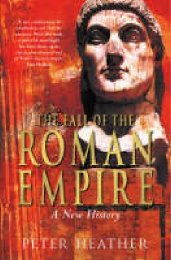Review for The Fall of the Roman Empire
A perfect storm - or one damn thing after another
Having bought Heather's 'Empires and Barbarians', I decided that I ought to read his 'The Fall of the Roman Empire' first. I was not disappointed - Heather's scholarly and closely argued book reads almost like a detective story as the evidence is pieced together and falls into place. His style is easy, and he doesn't fear to employ the demotic on occasions to telling effect. What's more, he helps the reader along the way by a clear sectional layout with recapitulations to end each section, plenty of maps, dramatis personae, timeline and glossary.
The legacy of Empire
I've always been fascinated by the Roman Empire: what made it, what held such a vast empire together for almost half a millennium in the ancient world - and particularly, brought up on Gibbon's views as I was, what caused its demise. Heather provided me with new insights based on the latest scholarly evidence, including that of archaeology - a revisionary history, in effect. You may well be thinking, 'So what? It all happened so long ago.' My response would be that, like it or not, our world has been shaped by the legacy of Rome - our language is saturated with Latin-rooted words if we are thinking of educated discourse, Romance languages are grounded in Latin; we use many Latin expressions, particularly in law (and Roman Law itself is the basis for much continental law); animal species have Latin names, as do astronomical features, such as those on the moon and Mars; and we have so much evidence around us of Roman obsession with building, whether it's in survivals or in neo-classical designs.
The Roman army
One of the things about the Empire that has fascinated me is the Roman army - a rarity in the ancient world in that it was professional, well-trained and highly organised, with military roads spanning the Empire and effective logistical support. As such it was the backbone of the Roman state (albeit inclined to intervene in imperial succession on occasions); what I had not understood was just how effective it still was during the later Roman Empire as long as the tax base stood up.
The frontiers of Empire
The halting of western expansion at the Rhine that left 'Germania' outside the Empire I had always been led to believe was the result of the crushing defeat inflicted on Varus's legions by Arminius in AD 7 - thus far and no farther. Alas, a myth according to Heather - perpetuated by among others the Nazi regime in modern times. In essence the empire needed not only defensible frontiers but also resources from conquered lands to make their occupation worthwhile. For 'Germania' this was not the case, as the area was heavily forested and the Germanic tribes' technological level and system of agriculture did not produce a surplus. Moreover, until the later period, the tribes were too fragmented to represent a real threat and could be punished from time to time if they stepped out of line. Rome was easily able to control them as client kingdoms. Indeed, Varus's defeat was the result of disastrously poor leadership rather than Roman military inferiority.
The benefits of Empire
The conquered territories were far from the case of the lands of Europe under the Nazi conquest. In return for taxes, Rome brought the benefits of Roman civilisation at least to the wealthy, highly educated upper class landowners - the typical towns that sprang up all over the empire and flourished under pax romana , with their grand public buildings, arenas (alas often used for bloody public entertainments), water supplies and drainage systems, rubbish collection, baths and roads. Basically, if the inhabitants paid their taxes to maintain the legions that ensured the security of the Empire, they were left alone to get on with their lives. Thus, to take one instance, the idea of a conquering army leaving Britain in AD 410 when the legions were recalled was far from the truth. Indeed, a last despairing plea for help to the emperor from the Britons came as late as the 440s.
The downside
But not to paint too rosy a picture, the downside was the sheer size and difficulty of administering an empire from the centre that stretched some 4 000 kilometres from Hadrian's Wall to the Euphrates, given the slowness of communications in the ancient world, even with good Roman roads. One solution post-Constantine was to divide the Empire between east and west. Add to that a system of narrow, 'one-party' government that depended on favouritism and influence for promotion to official positions (no 'career open to talent' here); and a succession to the imperial throne that often depended on bloody confrontation between contenders followed almost inevitably by nights of the long knives. And then in the later Empire, a tendency to make ends meet by debasing the coinage with resultant inflation reflected other (external) pressures which it is Heather's appointed task to unravel.
Cracks in the edifice
The first cracks in the edifice began to appear with the breaching of the imperial frontier by Gothic Germanic tribes, seeking sanctuary in response to pressure from the nascent Hunnic Empire farther to the east. The former was a 'supergroup', no longer the scattered disunited tribes of earlier times. The outcome of the long Gothic war (377-82) was the breaching of the Danube frontier and the eventual settlement of the Goths within the Empire. For the first time, 'the barbarian other' was not on the doorstep, but inside the house. It was the start of a series of events precipitated by Hunnic advance westwards that led to the wholesale breaching of the Rhine frontier and the arrival within the Empire of a whole series of invading groups - Vandals, Alans, Suevi and lesser groups. To cut a long story short (and you must read it for yourself) though Rome managed to hold its own at times and could still administer sharp rebuffs, such as those by Flavius Constantius, the prosperous territories of the western Empire and hence the tax base gradually slipped from Rome's grasp as its military grip loosened. Alas, the Eastern Empire, the potential saviour of the west, had its own preoccupations: with the Persian Empire on its doorstep - but above all with the Huns. Whereas the invading Germanic tribes in the west did not have the military know-how to breach fortified Roman towns, the Huns did - and to devastating effect within the eastern Empire. Their advent prevented the last throw of the dice whereby the rich provinces of North Africa might have been prised from the grasp of the Vandals by a joint Western and Eastern invasion.
A revisionary history
What precipitated the fall of the Western Empire (the Eastern continued as the Byzantine Empire far longer)? In the words British Prime Minister Harold Macmillan used to explain his own problems in the early 1960s, it was 'Events, dear boy, events!' Put another way, in the case of the Roman Empire, it was just one damn thing after another. It wasn't Gibbons' weakening of will and soldierly virtues brought about by the advent of Christianity; it wasn't, as archaeology confirms, declining population or agricultural production. It was a whole concatenation of events that toppled an edifice that had stood for almost half a millennium: the development of supergroups, pressure from the Huns and their military prowess, the distracting presence of the Persian Empire on the eastern frontier and the gradual erosion of the tax base to maintain and equip a (western) standing army capable of withstanding the multifarious pressures. With the deposition in 476 of the western emperor Romulus Augustulus (Little Augustus), as he was contemptuously called, the Roman Empire in the west died, not with a bang, but with a whimper.
If you want to understand the long agony (it lasted roughly a century), Heather 's your man. I give him full marks for a clear and interesting analysis that weaves together what could otherwise be a confusing tale. I now look forward to reading his 'Empires and Barbarians'.


























Your Opinions and Comments
Be the first to post a comment!